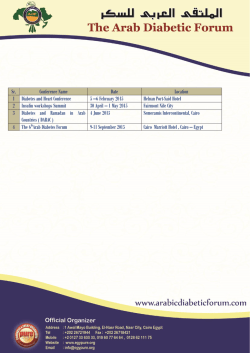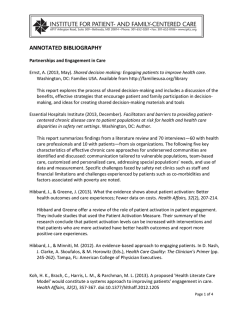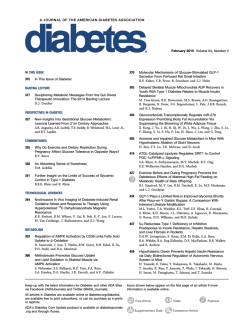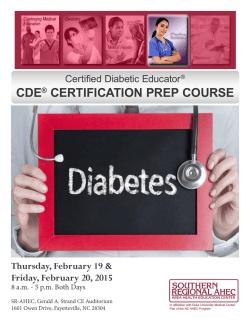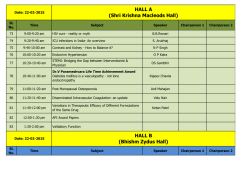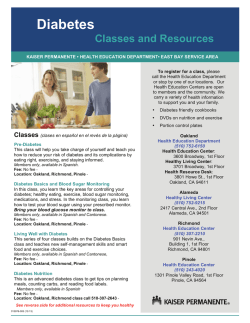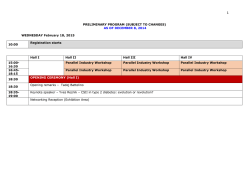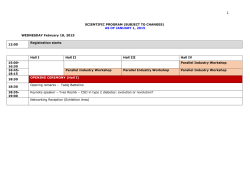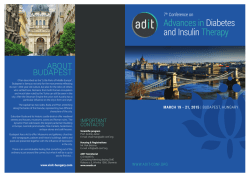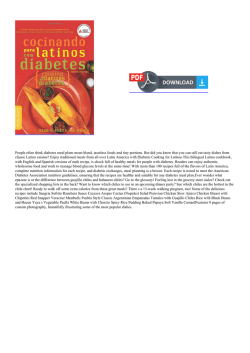
¡Si, Yo Puedo Controlar Mi Diabetes!
¡Si, Yo Puedo Controlar Mi Diabetes! ¡Si, Yo Puedo Controlar Mí Diabetes! (Si, Yo Puedo) is an evidence-informed, culturally competent educational program targeting low-literate Hispanic/Latinos with diabetes. The curriculum is predicated on the American Diabetes Association’s national standards of care and employs the Social Cognitive and Self-regulation theories as its foundational support. Empowerment is an overarching theme of the program, and to this end, Si, Yo Puedo aims to equip participants with knowledge and lifestyle skills to better control their diabetes. Relevance • Diabetes cost Texas more than 12 billion dollars. 1 • Texas Hispanic/Latinos 45 to 64 years of age are disproportionately affected by diabetes prevalence (11%) than their White, non-Hispanic counterparts (16.8%). • In 2007, mortality rates were more than double among Texas1 Hispanic/Latinos (40 per 100,000) than White, non-Hispanics (19 per 100,000).1 • Among persons with diabetes, a higher proportion of Texas Hispanic/Latinos (32.5%) could not see a doctor in the last 12 month due to cost compared to Whites (16.5%).2 Response • Proper management is critical to minimize the potential negative effects of diabetes. • Self-management education is the cornerstone for diabetic care and vital for blood glucose control. • Recognizing the need for a culturally relevant type 2 diabetes self-management education targeting Texas Hispanic/Latinos, Si, Yo Puedo was developed to address this gap in health programming. Results In 2014, 120 individuals registered for the classes, with 50% (N = 60) of participants completing the classes. Classes were provided in four Texas counties (Knox, McLennan, Webb, and Hidalgo) and one community clinic (Christ Clinic). Moreover, one class was out-of-state from a partnership with Rio Rancho, New Mexico (N = 79). The findings below summarize the impact of the Si, Yo Puedo program. Outcome indicators include diabetes knowledge, self-efficacy, acculturation, and diabetes self-care behaviors. • Demographic characteristics: 81% were female; average age was 47 years; 98% were Hispanic; 69% reported their yearly income as $20,000 or less; 61% reported having less than a high school education; 89% reported having no medical insurance. • Participants were minimally acculturated. Approximately 40% of the sample had a score of 10 or below, which indicated minimal acculturation. • Among those completing the seven-week program, improvements in diabetes knowledge between pre- and post-test were observed; pre-test was 7.8 (out of 10) and a post-test score of 9.2 (out of 10). • At post-test, participants completing the course reported significantly higher self-care scores, with an increase of over 9 points in the mean scores from pre-tests (22.25 out of 44) to post-tests (31.28 out of 44). • Furthermore, improvements in self-efficacy scores were also observed: pre-test mean score of 2.59 (out of 4) and post-test mean score of 3.45 (out of 4). Overall, 2014 evidence demonstrates that the ¡Si, Yo Puedo Controlar Mi Diabetes! program significantly enhances participants’ engagement in diabetes self-care behaviors, improves their self-confidence about diabetes self-care, and increases their diabetes knowledge. This program lends support to the benefits of a culturally competent diabetes self-management education targeting lower literate, Spanishspeaking Hispanic/Latinos with diabetes. Given the high rates of diabetes among Hispanic/Latinos, Si, Yo Puedo is a program to address this concern. Over the past year, these counties partnered with community stakeholders to extend AgriLife Extension’s reach to disadvantaged populations. We envision this effort to continue, which will help to ensure the sustainability of Si, Yo Puedo. Success Stories • “I learned that my eating habits were very poor because I ate the wrong foods. Mrs. Siller taught us how to eat healthier. What to do if our sugar levels get up or down, and to take better care of our teeth, eyes and feet. To take care of ourselves; if we don’t, no one will! Thank you so much Mrs. Silla.” Si, Yo Puedo Lesson Topics • Week 1: ¿Qué es la diabetes? (What is diabetes?) • Week 2: Revisando sus niveles de glucosa en la sangre (Checking your blood glucose levels) • Week 3: Comiendo de manera saludable condiabetes (Eating healthy with diabetes) • Week 4: Mantengase activo con diabetes (Be active with diabetes) • Week 5: Los medicamentos y la diabetes (Medicines and diabetes) • Week 6: Prevención de los problemas relacionados con la diabetes (Preventing diabetes problems) • Aceptar mi diabetes, cuidarme y controlarme, aprendí a vivir mejor. (“Accept my diabetes, to take care of myself and to control it; I learned to live better.”) • …a contar mis carbohidratos y leer el nivel nutricional en las comidas y lo importante que es checar mi nivel de azúcar. (“I learned to count carbohydrates and to read nutritional labels in food. Also, to check my sugar levels frequently.”) Educational programs of the Texas A&M AgriLife Extension Service are open to all people without regard to race, color, sex, religion, national origin, age, disability, genetic information, or veteran status. The Texas A&M University System, U.S. Department of Agriculture, and the County Commissioners Courts of Texas Cooperating Contact: AgriLifeExtension.tamu.edu Family Development & Resource Management Texas A&M AgriLife Extension Service ph. 979.845.3850 fx. 979.845.6496 http://fcs.tamu.edu
© Copyright 2026
